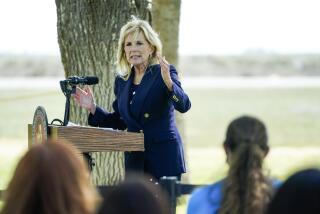Trail Mix
- Share via
Occasional morsels from Campaign 2000
Granny D-nied
Does money buy access? Just ask Granny D.
Doris Haddock, who spent 14 months walking across the country in a show of support for strengthening federal campaign finance laws, says she was asked to pay $500 when she tried to talk her way in to meet with Al Gore at a fund-raiser last August in Little Rock, Ark.
The vice president and presumptive Democratic presidential nominee is making campaign finance reform a priority. He even praised the 90-year-old New Hampshire woman, also known as Granny D, as he unveiled new campaign finance proposals in a speech at Marquette University in Milwaukee.
“We took signs hoping he would notice us, but nothing happened,” Haddock said of the Little Rock event. “So we went in and said, ‘Could we talk to [President] Clinton and Gore?’ . . . But they said no, we couldn’t go in unless we had $500 for the luncheon.”
Haddock defended Gore, however, and said she wasn’t too upset by the snub.
“He had nothing to do with it, it was the aides, and I can understand,” said Haddock, who completed the 3,000-mile walk from California to Washington on March 1. “I thought he was missing a good photo op.”
What’s in a name?
Voters in Missouri had best mind their Ps and Bs. In an August congressional primary, it’s Richard A. Gephardt vs. Richard A. Gebhardt.
Gephardt is the House minority leader and a 12-term congressman. Gebhardt is a 65-year-old political newcomer from St. Peters, near Gephardt’s home base of St. Louis.
When the rookie filed last Monday to challenge the veteran for the Democratic nomination, Gephardt, who hopes to become speaker if the Democrats regain control of the House, submitted paperwork changing his ballot name to “Richard A. (Dick) Gephardt.”
“It is the name by which I have been known since childhood. Furthermore, I wish to avoid any confusion caused by others who wish to mislead and confuse voters,” Gephardt wrote on his name-change paperwork.
Gender gap
Women are slightly less likely than men to be interested in the presidential campaign and more likely to be dissatisfied with politics, according to a four-month series of polls.
But women also are more likely than men to believe the election will make a difference in their lives, according to the surveys for Harvard University’s Joan Shorenstein Center on the Press, Politics and Public Policy.
Men and women, for example, have not paid equal attention to this year’s presidential race. On average, 37% of men said they had thought about the campaign in the past day, compared with 32% of women.
Women, meanwhile, were more likely than men to be dissatisfied with politics and politicians. A survey conducted March 1-5 showed that 76% of the female respondents on average felt that politics is “disgusting,” compared with 67% of men on average.
Raising money naturally
When the Federal Election Commission announced last week how much money presidential candidates had received in the latest installment of federal matching funds, the news about John Hagelin was barely a footnote. But for Hagelin, it was a $100,000 footnote.
Hagelin is running for the White House for the Natural Law Party, and the $100,000 was the first installment in federal funds he’s received. By contrast, John McCain got $3.7 million, bringing his total to $10.6 million.
This is the third presidential bid for Hagelin, who holds a Harvard PhD and a professorship at the Fairfield, Iowa-based Maharishi University of Management, which is rooted in transcendental meditation. In the California primary he received 5,298 votes.
By the numbers
170--Number of days a contractor says it would take to restore previously missing White House e-mails, which may contain information relevant to investigations of the Clinton-Gore administration
218--Number of days before the presidential election
Quote file
“We want our teachers to be trained. We want them to know how to teach the science of reading. In order to make sure there’s not this kind of federal cufflink, federal structure on programs, there needs to be flexibility on the state level.”
--George W. Bush, intending to bemoan restrictive federal “handcuffs” while visiting a Milwaukee middle school.
Compiled by Massie Ritsch from Times staff and wire reports
More to Read
Get the L.A. Times Politics newsletter
Deeply reported insights into legislation, politics and policy from Sacramento, Washington and beyond. In your inbox twice per week.
You may occasionally receive promotional content from the Los Angeles Times.









